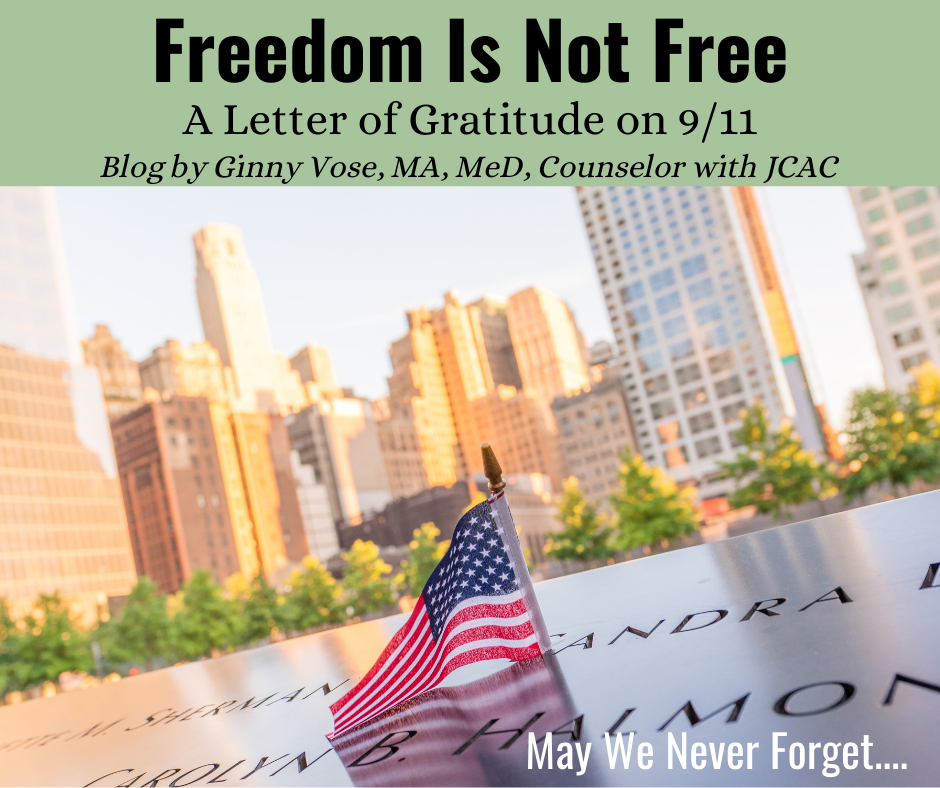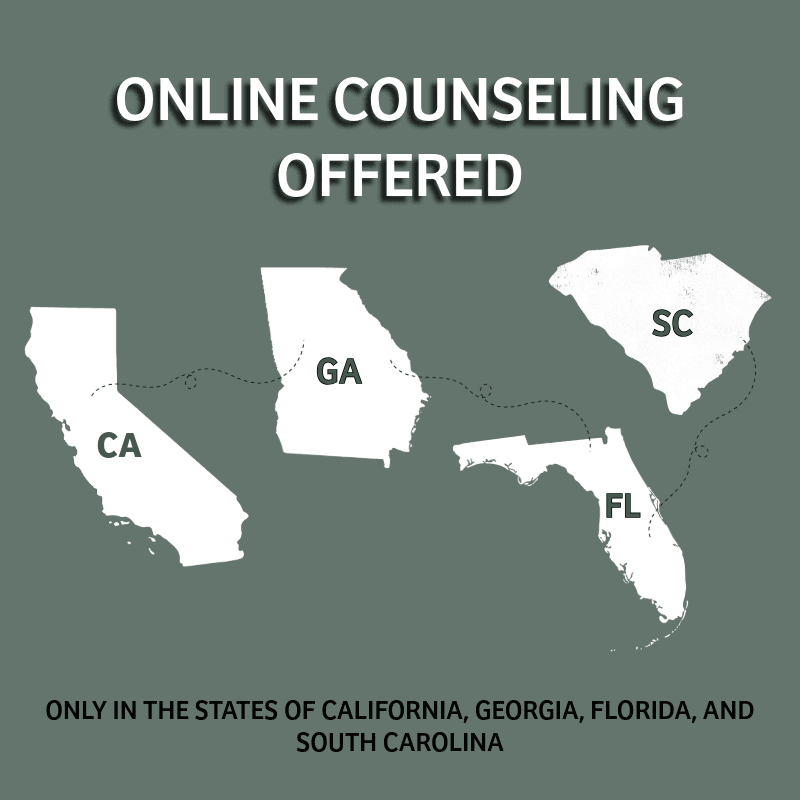Freedom Isn’t Free
Blog by Ginny Vose, MA, MeD, Counselor with JCAC
Today we remember that horrible day when America was attacked on our own soil in such a senseless act of terrorism. I want to take time to thank all of our first responders, fire fighters, police officers, and our men and women from each branch of the military for volunteering to put yourself in harm’s way to keep us all safe. I can only imagine the high cost that you have or still are paying for me to be able to live as I do. You have my utmost respect and full support. You are always in my heart and in my prayers. Because you run toward danger each day, you are subject to being traumatized. You can even develop something called Post Traumatic Stress Disorder or PTSD. I know that many of you are fighting a silent battle with the trauma that you have been subjected to in your line of work. You may feel reluctant to get help. In this article, I will share with you what PTSD is, how it manifests in your everyday life, and that there is help to rid yourself of the symptoms that can keep you from living your best life.
What PTSD Is:
Someone witnesses or is involved in a horrific event, such as a natural disaster, a serious accident, fought in a war, been involved in a terrorist attack, or anyone who has been threatened with death, sexual violence, or serious injury, is considered to have been traumatized. It is possible that after being traumatized, you could experience nightmares, and have physical symptoms such as nausea, fatigue, or headaches. You might avoid talking about anything that reminds you of the trauma. It is possible to view the world in a negative manner and find happiness impossible following a trauma. Some people struggle to sleep or become very irritable after experiencing a trauma. You could have some hard days. For many who suffer the initial struggles of trauma, you are able to work through it on your own or after talking to friends, family, or a counselor. For many, symptoms will subside and resolve. If the traumatic symptoms continue for a month or more, it is possible that you may be developing PTSD. This is nothing to be ashamed of, but it does need to be dealt with so that you can get back to living your life to the fullest.
How PTSD Manifests in Your Everyday Life:
According to the Diagnostic and Statistical Manual of Mental Disorders (DSM-5), symptoms of PTSD fall into four categories:
Intrusive Thoughts
- Unwanted, continuous thoughts about the trauma
- Reliving the trauma as if it is happening again (flashbacks)
-Dreams and nightmares about the trauma
-Severe emotions or physical reactions to things that remind you of the trauma
Avoidance
-Avoiding thinking about or talking about the trauma
-Avoiding people, places, or activities that remind you of the trauma
Negative Changes in Thoughts and Moods
-Having excessive negative thoughts about yourself or others
-Feelings of hopelessness about the future
-Memory problems
-Difficulty maintaining close friendships
-Feeling detached from family and friends
-Lack of interest in activities that you once enjoyed
-Difficulty experiencing positive emotions
-Feeling emotionally and physically numb
Emotional and Physical Changes
-Being easily startled
-Always being on high alert for danger
-Self destructive behavior such as drinking too much or driving too fast
-Insomnia
-Lack of concentration
-Irritability and angry outbursts toward others
-Feelings of guilt or shame about what happened
Hope For Those Who Suffer With PTSD
If you find yourself suffering from the aftermath of a Trauma, I urge you to seek help from a counselor who is trained to work with those who have been traumatized. There are several therapies that could be used to help you. Cognitive Behavioral Therapy or CBT helps you to work on changing your thinking patterns to stop the negative thoughts that you have been feeling. Another technique is called Cognitive Processing Therapy or CPT. This allows you to explore the points that are keeping you stuck with those negative feelings. The most widely used trauma therapy is called Eye Movement Desensitization Reprocessing or EMDR. This therapy helps to move the memories of the trauma from your Limbic System when those thoughts feel as if they are happening right now to your Prefrontal Cortex where they are a memory that does not bother you anymore. When reaching out to a therapist, ask about what therapies they use to help treat trauma.
I know that for many, especially First Responders, Fire Fighters, Police, and those who have served in the Military, it may seem hard to reach out to a counselor for help. Let me assure you that all that you say will be kept confidential with very few exceptions. Counselors like myself would be honored to walk alongside you. It is thanks to men and women like you that I feel safe and I have the life that I enjoy. Your sacrifice has not been lost on me. It would be my honor to give back to you. Thank you again for your service.
With Gratitude, Ginny
Click Here to learn more about Ginny Vose
Click Here to schedule a time to talk with Ginny
Click Here to learn more about JCAC

9/11, PTSD, First Responders, Military Service, Counseling, PTSD Counseling
Johns Creek and Alpharetta Counseling (#JCAC) is a warm and family orientated counseling practice in Alpharetta, Ga. We offer online counseling services in the states of Georgia and Florida. We offer in-office counseling service at our Alpharetta office which is conveniently located to serve Johns Creek, Milton, Roswell, and Cumming, Ga.
The JCAC Counselors specialize in counseling services throughout the lifespan! We offer play therapy, counseling for children, parental support, adolescent counseling, mental health services, couples counseling, premarital therapy, and individual counseling for adults.
To learn more about our practice, click here!
#JCAC #Anxiety #Depression #Couples #Adolescents #PlayTherapy #Premarital #MentalHealth #Counseling #OnlineCounseling #Alpharetta #JohnsCreek #EDMR #Social-Skills-Groups #Parenting #Digital Learning Pods #Marriage Counseling #Couples Therapy #Engaged #PTSD Counselin #First Responders #9/11 #Military #Counseling for First responders #EMDR #What is PTSD #PTSD symtpoms #Gratitude for First Responders





